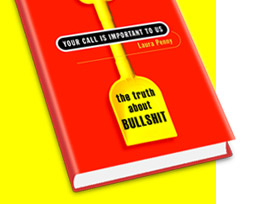
|

You say there are two types of bullshit: complex
and simple. What are some current examples you can cite of both?
Complex bullshit is better known as bafflegab or jargon, and it is the native argot of modern bureaucracy. Simple bullshit is something too good to be true, like ads, or the blips on the cable, news crawl. The president's plan to privatize social security is complex and riddled with jargon, but his presentation of the plan in town halls always involves lots of simple bullshit, like insisting that he's just giving people their money back. Most of the contracts we sign, such as those for mortgages and insurance, are full of complex bullshit, but it is simple bullshit that gets us to sign them. There is, I would say, more simple bullshit than there is complex bullshit in the public sphere. For example, the big news stories this week (at time of printing) were the Michael Jackson verdict and the Tom Cruise/Katie Holmes engagement, both of which are good examples of simple bullshit.
What
inspired you to write this book?
The impetus to write this book was the ubiquity, the omnipresence of bullshit. I was surprised, given how much bullshit there is, that there wasn't more written about it. The bullshit pandemic is a problem that concerns me on a couple of levels. First, I worry about it as an English teacher and a person who cares about language. Second, I have political concerns about it. I think people my dad's age have some vestigial memory of trusting their leaders and their institutions. I don't think people my age, or younger, have the same experience. And this is a big problem because all the things that we rely on, like free markets, democracy, and freedom of the press, require a certain degree of public trust to function. I worry we are squandering that trust for the short-term gain of the fortunate few.
You
split the book into industries. Are there one
or two sectors out there that are just prime examples of b.s. production
today?
I split the book into sectors because I do think b.s. is one of the growth industries of our time. It is not an industry unto itself, but it rides shotgun with all the major sectors of industry, so I chose to proceed that way, by tracing bullshit to the industries that produce it. The two sectors that strike me as the most obvious current producers of b.s. are the advertising/public relations industries, since they encourage all the other industries to tart themselves up, and the pharmaceutical industry. The insurance industry and the service sector are also pretty mush-mouthed, but big pharma makes the most dough and produces the most disingenuous claims for their products. In
the book you trace the evolution of bullshit. What can we learn about
the history of b.s. that tells us about our society today?
I think there has always been some b.s. in public life. We certainly didn't invent it, but we have increased it, and that is what is really distinctive about society today. We do not merely accept bullshit-we expect it. I think that this has dangerous consequences for society in general. People are beginning to disengage from public life, whether that's because of the media or politics, because they are weary of the prevalence of bullshit; but this very lack of participation ensures that there will only be more bullshit.
Based on your b.s. analysis, what can you tell us about the
media covering the Bush White House
I think the media has been way too easy on the Bush White House. They are probably the most secretive administration since Nixon's, and the press has done little to challenge them. Reporters are far too willing to accept and champion the administration's version of events. The only North American news outlet that is really critical of the administration, and its constant image management, is The Daily Show, as they need not worry about pandering for access to information. So we live in an age where only the fake news show is free to comment on real news.
There
is a large section on Tom DeLay in the government chapter. Are you surprised
he has been able to shake the allegations against him using his ability
to b.s.?
Tom DeLay never disappoints me. Seriously, I love that guy. He convinces me I am not paranoid. I am unsurprised that DeLay has weathered his ethics imbroglios thus far, and his defense, in the face of these allegations, is also pretty predictable: it's all the liberal media's fault. DeLay also put on a wonderful performance during the Terri Schiavo case, which happened after we went to press. DeLay was one of the politicians who spearheaded the campaign for a special session of congress to deal with the Schiavo issue. That was total bullshit; it was a matter for the judiciary, and we don't write laws for one person. Laws are, by definition, for everyone. The Schiavo case was simply a way to throw a bone to the pro-life base and to advance the bullshit argument against judicial activism. In the guise of Christian compassion, he used that poor brain-dead woman as a political football. Moreover, as a few newspapers noted, DeLay pulled the plug on his dad, who was on life support, back in the late 80s. |



